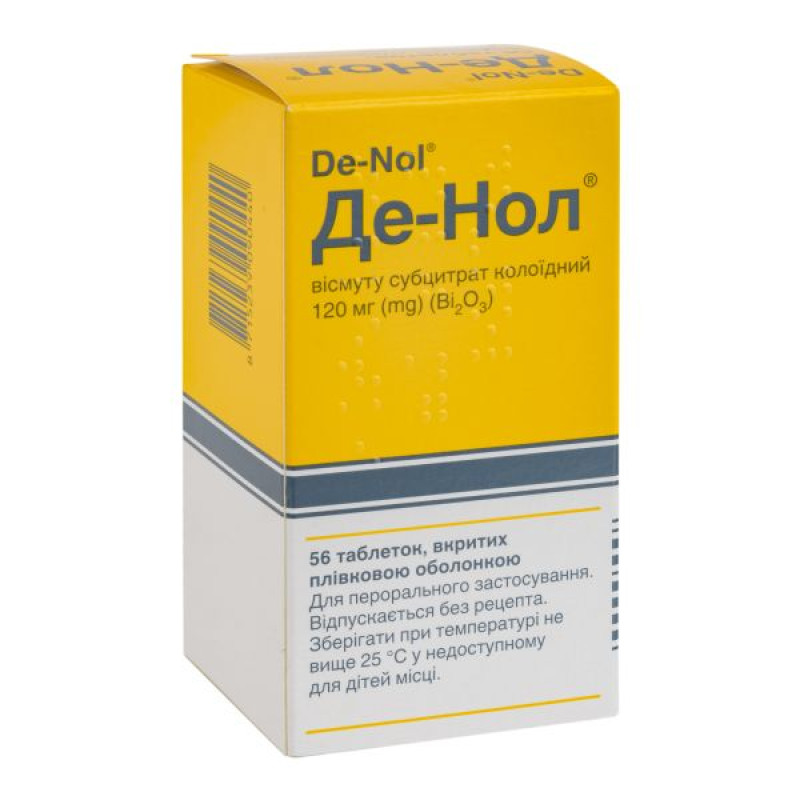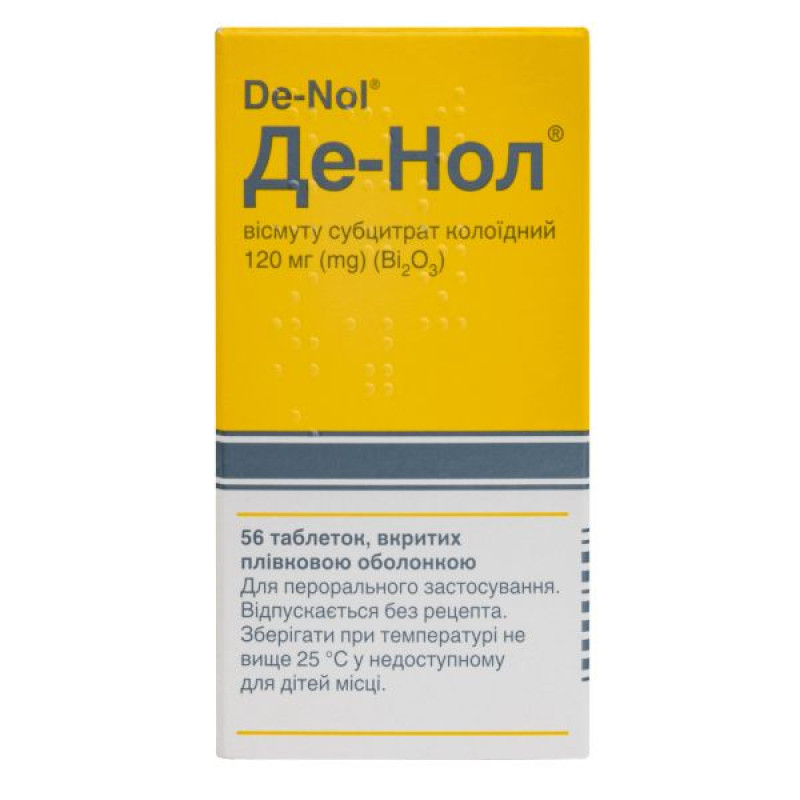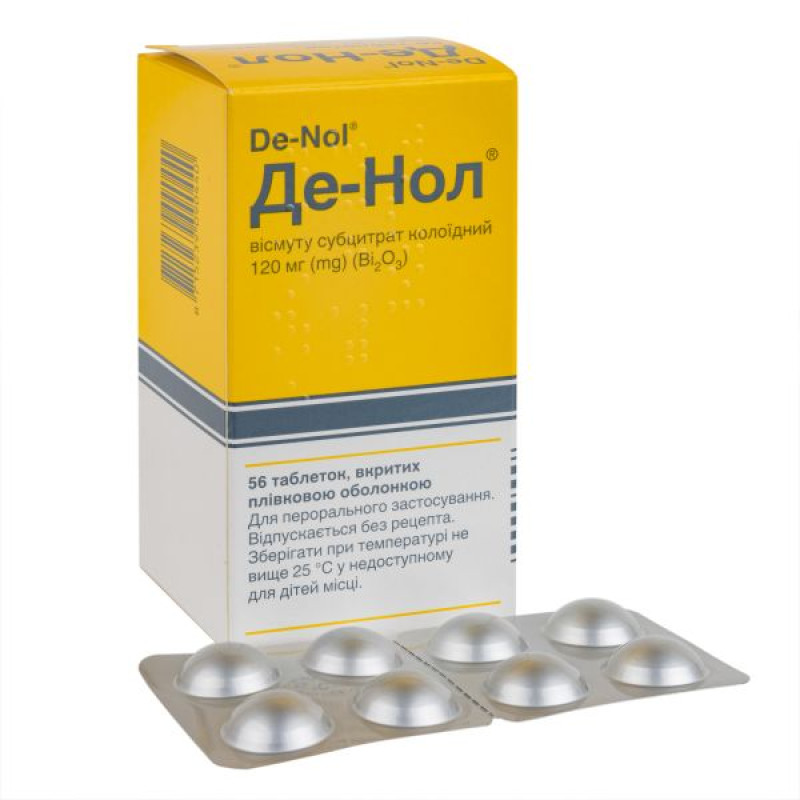De-nol film-coated tablets 120 mg blister No. 56

Instructions De-nol film-coated tablets 120 mg blister No. 56
Composition
active ingredient: colloidal bismuth subcitrate;
1 tablet contains colloidal bismuth subcitrate equivalent to 120 mg Bi2O3, which is contained in a solution of dry bismuth subcitrate;
Excipients: corn starch, povidone, polacrilin potassium, macrogol 6000, magnesium stearate, hypromellose.
Dosage form
Film-coated tablets.
Main physicochemical properties. The tablets are round, biconvex, white with a cream tint, with the inscription “gbr 152” on one side and the company logo on the other.
Pharmacotherapeutic group
Drugs for the treatment of peptic ulcer and gastroesophageal reflux disease. Bismuth subcitrate. ATC code A02B X05.
Pharmacological properties
Pharmacodynamics
In the acidic environment of the stomach, the drug forms a protective film on the surface of ulcers and erosions, which promotes their scarring and protects against the effects of gastric juice; increases the synthesis of prostaglandin E2, stimulates the formation of mucus and bicarbonates, leads to the accumulation of epidermal growth factor in the defect zone, reduces the activity of pepsin and pepsinogen. The drug has bactericidal activity against Helicobacter pylori.
Pharmacokinetics
The drug is practically not absorbed from the gastrointestinal tract; only a small amount of the active substance enters the blood and is excreted in the urine, while the concentration of bismuth in the plasma decreases rapidly after the end of treatment. It is excreted mainly with feces.
Indication
Gastric and duodenal ulcers, chronic gastritis, including those caused by Helicobacter pylori (as part of anti-Helicobacter therapy regimens).
Contraindication
Hypersensitivity to the active substance or to any of the excipients. Severe renal failure.
Interaction with other medicinal products and other types of interactions
No other medicines, food or drinks, antacids, milk, fruit or fruit juices should be consumed half an hour before or after taking De-Nol®, as they may alter its effect.
Reduces the absorption of tetracyclines; simultaneous use of drugs containing bismuth (Vicalin, Vicair) increases the risk of excessive increase in the concentration of bismuth in the blood.
Application features
The stool may turn black, in which case you should consult a doctor. You should not take antacids and drink milk half an hour before and half an hour after taking the drug, as the existing gastric juice is needed to form a protective layer.
Long-term use of high doses of bismuth compounds is not recommended due to the occurrence of reversible encephalopathy in rare cases. If the recommended dosage regimen is followed, the risk of this side effect is very small, however, it is not recommended to take other bismuth-containing drugs while taking this drug.
Ability to influence reaction speed when driving vehicles or other mechanisms
There is no data on the effect of De-Nol® on the ability to drive vehicles or other mechanisms. However, such an effect of De-Nol® is unlikely.
Use during pregnancy or breastfeeding
Not recommended.
Method of administration and doses
Adults and children over 14 years of age should take 1 tablet 4 times a day 30 minutes before meals and at night or 2 tablets 2 times a day.
Children aged 8 to 14 years should be prescribed 1 tablet 2 times a day 30 minutes before meals.
Children aged 4 to 8 years should be prescribed at a dose of 8 mg/kg/day; the daily dosage should be divided into 2 doses, but not more than 2 tablets per day.
The tablets should be taken with a small amount of water. The duration of the treatment course is 4-8 weeks. During the next 8 weeks, you should not take drugs containing bismuth.
If Helicobacter pylori is present, use in treatment regimens according to national recommendations.
Children
De-Nol® can be used in children from 4 years of age.
Overdose
Symptoms of intoxication
Acute massive overdose may result in renal failure with a delayed onset of up to 10 days.
Treatment of intoxication
After a single ingestion of a very high dose, treatment consists of gastric lavage followed by doses of activated charcoal and osmotic laxatives. This therapy usually reduces the absorption of bismuth, so additional measures are not necessary.
Bismuth concentrations in blood and urine should be determined in cases of acute and chronic intoxication to identify the relationship of any symptoms to increased bismuth exposure.
Chelation therapy with dimercaptosuccinic acid (DMSA) and dimercaptopropanesulfonic acid (DMPS) is used if symptoms are caused by acute or chronic bismuth overdose.
In case of severe renal failure, chelation therapy should be accompanied by hemodialysis.
Adverse reactions
On the part of the digestive tract: black stools are possible when using De-Nol®, due to the formation of bismuth sulfide. Such stools can be easily distinguished from melena.
Uncommon (>1/1000, <1/100)
On the part of the digestive tract: nausea, vomiting, constipation, diarrhea.
Skin and subcutaneous tissue disorders: mild skin allergic reactions (rash, itching).
Very rare (<1/10,000), frequency unknown (cannot be estimated from the available data):
Immune system disorders: anaphylactic reaction.
Expiration date
4 years.
Do not use the drug after the expiration date indicated on the package.
Storage conditions
Store at a temperature not exceeding 25 °C out of the reach of children.
Packaging
8 tablets in a blister; 7 blisters in a cardboard box.
Vacation category
Without a prescription.
Producer
Astellas Pharma Europe B.V.
Location of the manufacturer and its business address
Hogemat 2, 7942 JM Meppel, Netherlands.
There are no reviews for this product.
There are no reviews for this product, be the first to leave your review.
No questions about this product, be the first and ask your question.






